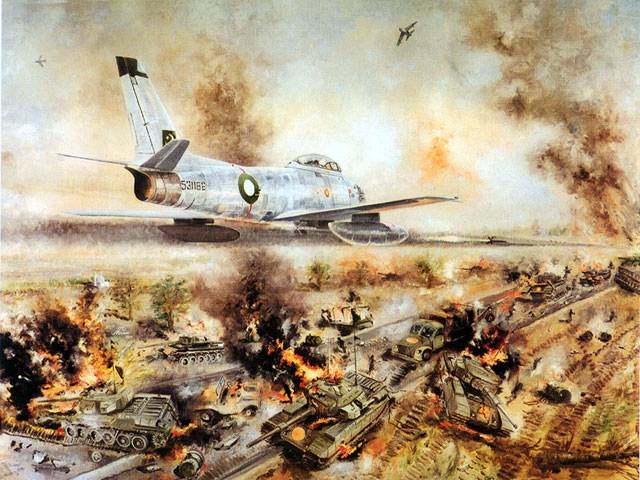At the heart of every nation lies the spirit of its defenders, and few embody this spirit as powerfully as the heroes of the Pakistan Air Force (PAF). They have consistently served as the nation’s foremost choice in countering enemies. From the thunderous skies of the 1965 Indo-Pak War, when the odds were heavily stacked against them, to the cutting-edge technological advancements of today, the PAF has upheld the nation’s pride. This day is not merely a commemoration of past valour but a celebration of an ongoing journey marked by bravery, innovation, and unwavering resolve.
The 1965 war between India and Pakistan was the first true test of the PAF. It was a trial of PAF’s leadership, professionalism, and spirit, demanding a swift and effective response to India’s aggression. During this pivotal conflict, the aircraft ratio between the two nations was 1:3, 157 for Pakistan and 450 for India. Despite being significantly outnumbered, Pakistan emerged victorious. The attrition rates for the PAF and the Indian Air Force (IAF) were 0.7 and 1.67 respectively, underscoring the PAF’s remarkable success in the conflict.
Among the numerous tales of bravery from the 1965 war, two names stand out: Squadron Leader Sarfaraz Ahmed Rafiqui and Squadron Leader MM Alam. During the 1965 conflict, Squadron Leader Rafiqui’s aircraft guns jammed, yet he steadfastly refused to abandon his mission to protect the formation during an attack on the IAF’s Halwara Airfield. His unwavering courage and sacrifice have left an indelible mark on the history of aerial warfare. Similarly, Squadron Leader MM Alam achieved the extraordinary feat of downing five Indian fighter aircraft in under a minute. This remarkable accomplishment earned him international acclaim as the world’s fastest ace pilot. The PAF’s extraordinary performance in the war not only thwarted the enemy but also inspired generations of pilots and aviation enthusiasts, epitomising the zenith of bravery and excellence in air combat.
Beyond the individual brilliance of PAF fighter pilots and officers from other branches, such as Air Defence, Engineering, Logistics, and Administration etc. several other key factors contributed to the force’s success against the IAF. These included exemplary leadership, strategic acumen, operational readiness, and swift decision-making. The PAF not only harnessed these defining elements from the 1965 war but also embedded them deeply in its institutional memory. This strategic foundation has enabled the PAF to adeptly navigate the evolving regional security landscape for decades.
To preserve the PAF’s legacy of tenacity and formidable capability, as demonstrated in the 1965 war, the current Chief of Air Staff, Air Marshal Zaheer Ahmad Babar Sidhu, has initiated a strategic reset. This overhaul aims to provide more focused and meaningful training for PAF personnel, integrate cutting-edge equipment and weapons, and develop a self-sufficient, advanced military-industrial base using indigenous technologies. To mention a few, the acquisition of the J-10C to re-instate the PAF’s first-shoot capability, along with the potential procurement of the Shenyang FC-31 (Gyrfalcon Stealth Fighter, a game changer in South Asia) and the establishment of the National Aerospace Science and Technology Park (NASTP) across various cities in Pakistan, underscores the PAF’s commitment to realising Quaid-e-Azam’s vision which he stated in his speech at PAF’s Flying School at Risalpur, where he said, “There is no doubt that a country without a strong Air Force is at the mercy of any aggressor. Pakistan must build up its air force as quickly as possible. It must be an efficient air force second to none. I charge you to remember that only with discipline and self-reliance can the [Royal] Pakistan Air Force be worthy of Pakistan.”
While the PAF has spared no effort to stay abreast of the latest technologies, it has also demonstrated similar operational readiness and swift decision-making in recent conflicts, echoing the capabilities it showcased during the 1965 war. The successful interception and downing of IAF aircraft in February 2019 underscored the PAF’s readiness and strategic acumen. Moreover, Operation Marg Bar Sarmachar conducted on 18th January 2024, highlighted PAF’s swift decision-making, adaptability, and resolve, reflecting the great legacy of past heroes and their leadership.
Therefore, it is crucial to recognise that the legacy of the PAF extends far beyond the past. It continues to soar to new heights, driven by a vision of innovation, excellence, and unwavering commitment to the nation. The PAF’s efforts to maintain regional stability underscore its significant role in transforming strategic environment. The PAF’s journey—from the heroic deeds of 1965 to its present-day achievements—is a testament to its relentless pursuit of excellence. This journey reflects the courage, dedication, and patriotism that define the PAF. On this PAF Day, let us honour the sacrifices of those who gave their lives in the nation’s service and celebrate the bravery of those who continue to protect our skies.
Dr Bilal Ghazanfar is an Associate Senior Researcher at the Centre for Aerospace and Security Studies (CASS), Lahore. He can be reached at info@casslhr.com





